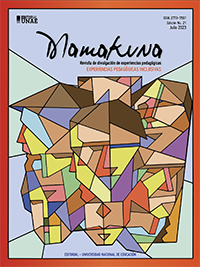Building learning experiences for all students: contributions of universal design of learning and design thinking
DOI:
https://doi.org/10.70141/mamakuna.21.875Keywords:
inclusive education, universal design for learning, design thinking, learning experiences, innovative proposalsAbstract
This article presents the results of a qualitative study based on the perceptions of teachers who took part in the workshop Diseño Universal para el Aprendizaje y Design Thinking para la Generación de Experiencias de Aprendizaje Inclusivas. The research affirms that a new epistemological foundation for inclusive education must be built based on the diversity of people. It also investigates the relevance of applying innovative processes and methodological approaches in education. At the same time, it evaluates the use of universal design for learning (UDL) and design thinking for teachers to build didactic experiences that allow all students to learn together. Finally, it is highlighted that they have the potential to have a positive impact on teachers' perceptions of innovation as part of their practice.
Downloads
References
Alba, C.; Sánchez, J. y Zubillaga, A. (2018). DUA. Diseño universal para el aprendizaje. Documento adaptado a la versión 2018. Edelvives. https://n9.cl/zmspy
Alba, C.; Sánchez, P.; Sánchez, J. y Zubillaga, A. (2013). Pautas sobre el diseño universal para el aprendizaje (DUA). Universidad Complutense de Madrid. https://educadua.es/doc/dua/dua_pautas_2_0.pdf
Artiles, L. (1990). Análisis del discurso: introducción a su teoría y práctica. Editora Búho. https://n9.cl/kmxgh
Bassi, J. (2015). Formulación de proyectos de tesis en ciencias sociales. Manual de supervivencia para estudiantes de pre- y posgrado. Ediciones El Buen Aire. https://n9.cl/6h971
Brown, T. (2008). Design thinking. Harvard Business Review, 1-11. https://n9.cl/b1c6l
Cárcamo, H. (2005). Hermenéutica y análisis cualitativo. Cinta de Moebio: Revista de Ciencias Sociales, (23), 204-216. https://www.moebio.uchile.cl/23/carcamo.html
Carroll, M. (2014). Learning from what doesn’t work: the power of embracing a prototyping Mindset. RED Lab. Research in Education & Design, 1-2. https://n9.cl/vr0f2
Cross, N. (1982). Designerly ways of knowing. Design Studies, 3(4), 221-227. http://dx.doi.org/doi:10.1016/0142-694X(82)90040-0
Díaz-Bravo, L.; Torruco-García, U.; Martínez-Hernández, M. y Varela-Ruiz, M. (2013). La entrevista, recurso flexible y dinámico. Investigación en Educación Médica, 2(7), 162-167. https://www.redalyc.org/pdf/3497/349733228009.pdf
Elliot, J. (2000). La investigación-acción en educación. Ediciones Morata.
Entre comillas. (12 de agosto de 2013). Carlos Skliar. “El Lugar del otro en los discursos sobre inclusión y diversidad” (parte 1). YouTube. https://www.youtube.com/watch?v=-z0eqA8h9-E
Gardner, H. (2001). Estructuras de la mente. La teoría de las inteligencias múltiples. Fondo de Cultural Económica.
Hasso Plattner Institute of Design at Stanford. (S.f.). Introduction to design thinking. Process guide. S.e. https://n9.cl/2ut56
Hernández, R.; Fernández, C. y Baptista, P. (2003). Metodología de investigación. McGraw-Hill. https://n9.cl/k2xv
Ideo. (2022). Design Thinking for educators. Ideo. https://n9.cl/f6458
Kelly, R. (2012). Educating for creativity: a global conversation. Brush Education.
Lindberg, T.; Noweski, C. y Meinel, C. (2010). Evolving discourses on design thinking: how design cognition inspires meta-disciplinary creative collaboration. Technoetic Arts, 8(1), 31-37. doi:10.1386/tear.8.1.31/1
Maturana, H. (1996). El sentido de lo humano. Dolmen Ediciones.
Micheli, P.; Wilner, S.; Bhatti, S.; Mura, M. y Beverland M. (2019). Doing design thinking: conceptual review, synthesis, and research agenda. Journal of product innovation management, 36(2), 124-148. https://doi.org/10.1111/jpim.12466
Ocampo, A. (2015). De la Neurodiversidad a la Neurodidáctica: algunas evidencias para comprender cómo diversificar la enseñanza de forma más oportuna. Revista Psicopedagógica REPSI, 139, 2-25. https://n9.cl/760jl
Pastor, C. (2016). Diseño universal para el aprendizaje: educación para todos y prácticas de enseñanza inclusivas. Ediciones Morata.
Pérez-Gómez, A. (2000). La cultura escolar en la sociedad neoliberal. Ediciones Morata.
Rittel, H. y Webber, M. (1973). Dilemmas in a general theory of planning. Policy Sciences, 4(2), 155-169. https://doi.org/10.1007/BF01405730
Sales, A.; Moliner, O. y Traver, J. (2010). La construcción de la escuela intercultural inclusiva desde procesos de investigación-acción. Universitat Jaume I, Universidad de Valencia.
Sánchez-Gómez, V. y López, M. (2020). Comprendiendo el diseño universal desde el paradigma de apoyos: DUA como un sistema de apoyos para el aprendizaje. Revista latinoamericana de educación inclusiva, 14(1), 143-160. http://dx.doi.org/10.4067/S0718-73782020000100143
Serrat, O. (2017). Knowledge Solutions. Tools, methods and approaches to drive organizational performance. Springer Open. doi:10.1007/978-981-10-0983-9_18
Skliar, C. y Larrosa, J. (2016). Experiencia y alteridad en educación. Facultad Latinoamericana de Ciencias Sociales.
Tarrés, L. (2015). Cómo aprendemos: la visión desde la teoría de las inteligencias múltiples [Tesis de licenciatura, Universidad de Zaragoza]. Repositorio Institucional de Documentos Universidad de Zaragoza. https://core.ac.uk/download/289980704.pdf
Valencia, C. y Hernández, O. (2017). El diseño universal para el aprendizaje, una alternativa para la inclusión educativa en Chile. Atenas, 4(40), 105-120. https://www.redalyc.org/articulo.oa?id=478055150008
Valles, M. (1999). Técnicas cualitativas de investigación social. Reflexión metodológica y práctica profesional. Editorial Síntesis.
Van Dijk, T. (2010). Discurso, conocimiento, poder y política. Hacia un análisis crítico epistémico del discurso. Revista de Investigación Lingüística, (13), 167-215. http://revistas.um.es/ril/article/view/114181/108121
Published
How to Cite
Issue
Section
License
Copyright (c) 2023 Mamakuna

This work is licensed under a Creative Commons Attribution-NonCommercial-ShareAlike 4.0 International License.





